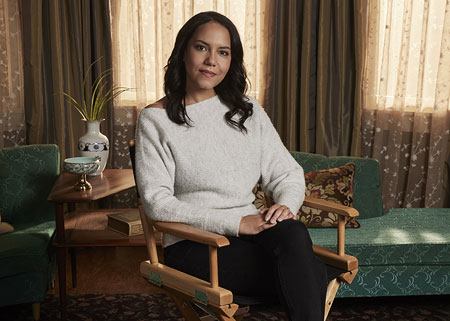
Marissa Jo Cerar Adapts Historical Injustice into Anthology Series Women of the Movement
Listen to her conversation with Committee of Black Writers Co-Chair Hilliard Guess on 3rd & Fairfax.
(2/18/2022)
 Marissa Jo Cerar. Photo: Matt Sayles for ABC
Marissa Jo Cerar. Photo: Matt Sayles for ABCIn honor of Black History Month, WGAW Committee of Black Writers Co-Chair Hilliard Guess talks with Women of the Movement creator-showrunner Marissa Jo Cerar on a recent episode of 3rd & Fairfax, where Cerar speaks about bringing the true story of Mamie Till-Mobley, who sought justice for her slain son Emmett Till, to the screen for ABC’s limited series.
Cerar, who grew up in a small rural town in Illinois called Athens (pronounced A-thins), was one of eight children—all of whom were adopted from different families. Cerar is Black, and her parents are white, along with six of her seven siblings. “I wanted to see myself in TV shows and movies, and back then I didn’t—now, we’re everywhere. I think I wanted to be the hero in the story, and so I just knew from a really young age that I wanted to write.”
After going to film school at Columbia College in Chicago, Cerar finished her senior year at a writer’s program doing a semester in L.A. She admittedly entered every screenwriting competition and applied for every fellowship program until she found a manager and became an executive assistant at a small production company. Cerar says she has always gravitated toward stories of people who are “othered,” and has an affinity for writing about mother-child relationships.
Her first staffing job was on The Fosters (created by Peter Paige & Bradley Bredeweg), where she worked her way up over the course of three years from staff writer, to story editor, to executive story editor, and gained production experience. From there, she worked on Shots Fired (created by Gina Prince-Bythewood & Reggie Rock Bythewood).
“Working for Reggie and Gina changed my life. I had never had one Black boss, let alone two….I got to do everything on that show,” Cerar says. Her time at Shots Fired was followed by writing for 13 Reasons Why (created by Brian Yorkey) and The Handmaid’s Tale (created by Bruce Miller). “Every job I’ve had, before getting the opportunity to run my own show, I’ve taken little pieces from it and I’ve learned from it.”
On hiatus and looking forward to spending time with her daughter after traveling to Toronto for Handmaid’s Tale, Cerar took a general meeting at Capital Entertainment. One of the ideas they presented to her was a book on Emmett Till. “The only way I would ever tell this story would be through the mother’s point of view,” Cerar recalls thinking at the time.
“This was before I knew everything. Before I read all the books and watched the documentaries and watched every single clip and read every newspaper article about the family. But I said I want to start with his birth, and I will not ever start the show with a body bag, with a crime scene. This will not be about the lawyers. This will not be about the police. This will not be about the murderers. It has to be about what it’s like to send your son on vacation, and never see him again.”
Cerar spent months researching and mapping out the entire series, then pitched it, wrote the first scripts, waited to get a writers’ room together and a series order, and then filmed Women of the Movement. A six-part anthology series that was initially pitched as an eight-episode series—Cerar says there are two episodes of content that had to be cut for time—Women of the Movement was shot on location in Greenwood, Mississippi where most of the real events took place, including the actual courthouse where the trial of Till’s murderers was held.
“So many people know this story. There are so many books. There are also different opinions, different points of view, some people say this number of people were there or this number….Adapting true life stories you have to condense. You have to combine. You have to summarize. You have to omit. You have to create composite characters. (I mean you don’t have to, but we had to for one character…) I cared a lot and I knew there would be a lot of opinions. I don’t read reviews, good or bad, because I take it very personally, because I care so much. And so I just want to live in the world where…the people who made it are proud of it and there you go.”
Cerar notes that she kept a picture of Mamie and Emmett above her computer while she was writing so she never forgot why she was doing what she was doing.
“Everybody was so committed to telling the story and taking themselves out of it and getting it right,” she says, crediting the cast and crew. “To have Emmett’s family, to have Wheeler Parker, Jr., who is Emmett’s cousin, the last living witness to the kidnapping and the incident at the market who was there, to have him tell me after he watched all six, ‘You got it right,’ was just the greatest gift.”
